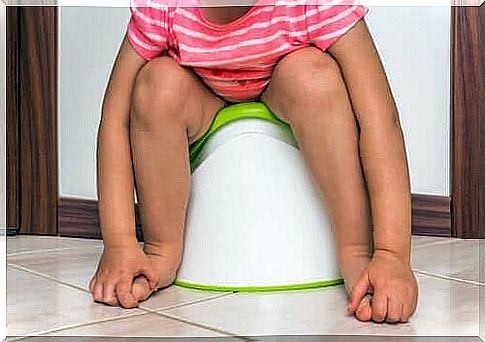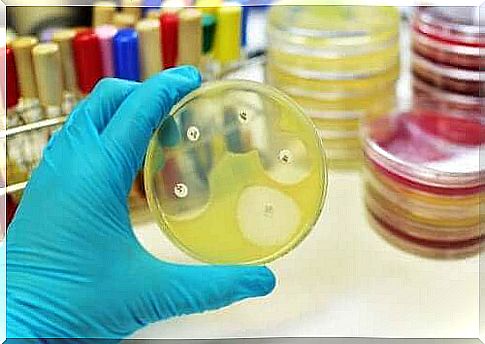Urinary Tract Infections In Children

Urinary tract infections in children are very common. These infections typically occur when bacteria enter the urinary tract, bladder and / or kidneys. It is necessary to go to the doctor to start treatment as soon as possible if the symptoms are present.
This article describes exactly what urinary tract infections are and how they are treated.
Urinary tract infections in children
Urinary tract infections come from the presence or proliferation of microorganisms in the urinary tract. An asymptomatic urinary tract infection is a different type of infection called asymptomatic bacteriuria.
Overall, urinary tract infections are distinguished from each other based on where the infection is located.
The most common bacteria that develop into a urinary tract infection in children are proteus, klebsiella, enterobacteria, streptococci and staphylococci. In newborns, they also often occur due to, among other things, listeria monocytogenes and enterococci.
Unfortunately , urinary tract infections are common in children and can be recurrent. They can actually develop into long-term complications. It is therefore very important to go to a pediatrician and start treatment as soon as possible to prevent the urinary tract infection from developing into something more serious or long lasting.
Symptoms of urinary tract infections

Typically , symptoms of urinary tract infections vary depending on the age of the child. It is actually more troublesome to detect the symptoms in newborns or children under six months. Common symptoms, however, include fever (usually higher than 37 ° C) and painful urination.
Overall, these are some of the most common symptoms:
- Pain, itching or a burning sensation when urinating.
- Fever.
- Pain in the area of the bladder.
- Smelly, cloudy urine, which may even contain blood.
- Irritability and vomiting.
- General discomfort and chills.
- A constant urge to urinate, even when there is only a small amount of urine.
In the case of acute pelvic inflammatory disease – or when the infection reaches the kidneys – the symptoms are usually more severe. For example, there may be severe cases of fever, fatigue, loss of appetite and vomiting.
Complications
Urinary tract infections also carry some risks and have possible complications. Some include:
- Urinary tract problems (for example, obstructions in the urethra).
- Malformations or complications of the kidneys.
- Vesicoureteral reflux, which is a disorder that causes urine to flow to the kidneys and ureters.
How do doctors diagnose urinary tract infections in children?
The doctor will perform a physical examination and will also perform a urine sample and urine culture. In general, the analysis will allow the specialist to determine the type of infection and choose the best treatment.
It depends on the age of the child how the doctor chooses to collect the urine for the analysis. In older children, the doctor will simply ask the child to urinate in a sterilized cup. For younger children still using diapers, however, doctors will usually use a catheter to collect the sample.
How are urinary tract infections in children treated?

Urinary tract infections are treated with antibiotics. Sometimes the doctor may ask for a new urine test after completing the treatment to confirm that the infection has been completely eradicated. This ensures that the infection will not reappear or spread to other parts of the body.
In the most severe cases of urinary tract infections, children may need to be hospitalized. This is especially true if he or she is less than six months old, if the infection has affected the kidneys or the baby is dehydrated.
Recommendations for parents
- When the first symptoms appear, the child should see a doctor immediately to get the correct diagnosis.
- After being diagnosed, the doctor’s instructions and recommendations are followed, and antibiotics are given based on the doctor’s recommendations.
- Keep an eye on how often the baby urinates. If they are old enough to talk, you can ask them how they are feeling and if they feel pain when urinating.
- Give the child plenty of water to drink. Avoid giving them sodas, teas and other beverages. They need to be well hydrated to help flush the infection out of their system.
- In terms of prevention, make sure that children who are still using diapers get their diapers changed frequently to help keep the baby’s urinary tract hygienic and clean.
- In older children who already use the toilet themselves, make sure that you teach them about proper hygiene and habits. For example, girls should be taught to wipe themselves from front to back so that the bacteria from the anus do not enter the urinary tract.
- Also choose cotton underwear and avoid synthetic materials that make it difficult to get rid of sweat.
In conclusion, urinary tract infections are usually mild and can be easily treated with antibiotics.
However, if you have any questions, you should always talk to a pediatrician for the best solutions and advice. Also remember to introduce good hygiene habits in children from an early age.









